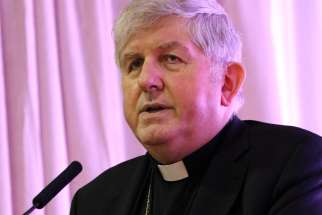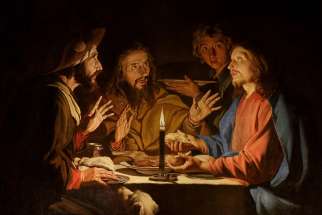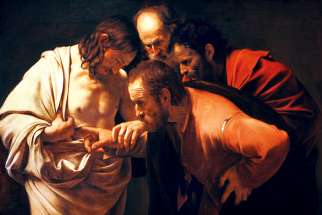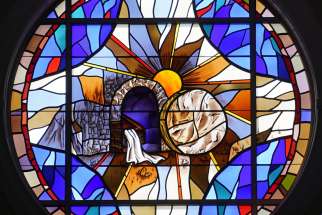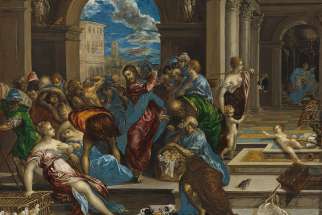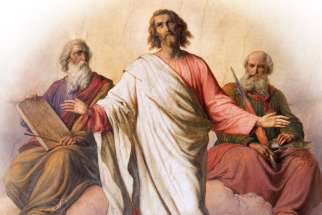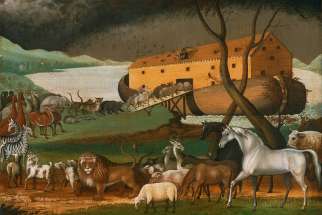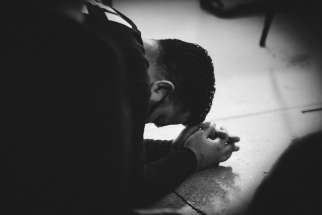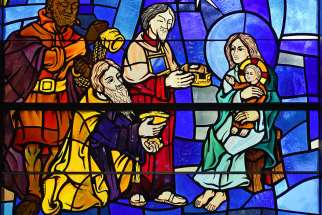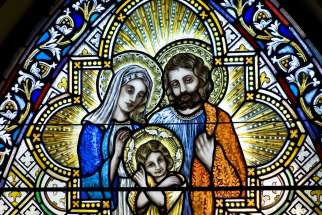Revelation shares the majesty of God
Will Donald Trump or Kamala Harris be inaugurated as the next President of the United States? One should not expect Revelation to provide the answer.
Third Sunday of Easter (Year B) April 14 (Acts 3:13-15, 17-19; Psalm 4; 1 John 2:1-5; Luke 24:35-48)
Peter had jarring news for those gathered around him. In their view, Jesus was a renegade and had died a disgraceful death. The whole matter should have ended there, but God had other plans. The God of Abraham, Isaac and Jacob — the God of all Israel — had raised Jesus up and glorified Him.
Second Sunday of Easter (Year B) , April 7 (Acts 4:32-35; Psalm 118; 1 John 5:1-6; John 20:19-31)
“There was not a needy person among them” — this was the source of their unity and their strength. They were of one heart and soul.
Resurrection of the Lord (Year B) March 31 (Acts 10:34a, 37-43; Psalm 118; Colossians 3:1-4; John 20:1-18)
The early followers of Jesus burned with the desire to communicate what they had seen, heard and experienced. If they were from the second or third generations of believers, they were able to rely on the testimony of those who had gone before them.
God's Word on Sunday: God is deep within our heart and soul
Fifth Sunday of Lent (Year B) March 17 (Jeremiah 31:31-34; Psalm 51; Hebrews 5:7-9; John 12:20-33)
Treaties, contracts and covenants are always in need of updating. Conditions and people change, and the longer an agreement remains in force, the more frayed at the edges it becomes. The older version is not put through the shredder — it forms the basis of the new agreement and can be considered its continuation.
Fourth Sunday of Lent (Year B) March 10 (2 Chronicles 36:14-17a, 19-23; Psalm 137; Ephesians 2:4-10; John 3:14-21)
Why had God allowed Jerusalem to be destroyed and the people to be driven into exile? The author of Chronicles was attempting to make sense of the devastation and ruin that had befallen his land and people. There was more than enough blame to go around. Both the priests and the people had fallen into corruption and pollution of the worst sort. In the eyes of the author, things like this do not just happen — there is always a cause, and most of the time the cause is human in origin.
God's Word on Sunday: There can be no substitute for God
Third Sunday of Lent (Year B) March 3 (Exodus 20:1-17; Psalm 19; 1 Corinthians 1:18, 22-25; John 2:13-25)
Many people do not know quite what to do with the Decalogue, aka the Ten Commandments. Some want to toss it out the window as irrelevant and outdated. Others will salute it and insist on its importance. Conservative “family values” politicians sometimes use it as a club to beat society, but when cornered, they are often unable to explain — or sometimes even to name — all 10 of the commandments.
God's Word on Sunday: We enter this world only by the grace of God
Second Sunday of Lent (Year B) Feb. 25 (Genesis 22:1-2, 9-13, 15-18; Psalm 116; Romans 8:31b-35, 37; Mark 9:2-10)
The story of the sacrifice of Isaac is one of the weirdest and most disturbing stories in the Bible. Isaac was the long-promised son and heir — the promise that had kept Abraham and Sarah going for so many years. And now God was commanding Abraham to sacrifice his son — just like so many of the other forms of religious worship in that time.
God's Word on Sunday: In this world, no one is excluded from God’s care
First Sunday of Lent (Year B) Feb. 18 (Genesis 9:8-15; Psalm 25; 1 Peter 3:18-22; Mark 1:12-15)
Rainbows are beautiful to behold and often they are double or even triple in nature. Many hopes and dreams attach themselves to the rainbow — riches, happiness, acceptance and a better world someplace else. But it serves another purpose in Genesis — it is a memo or reminder to God of the covenant with Noah and his descendants. It reminds God not to destroy the Earth by water again — as if God needed reminders!
God's Word on Sunday: We must always spread message of hope
Fifth Sunday in Ordinary Time (Year B) Feb. 4 (Job 7:1-4. 6-7; Psalm 147; 1 Corinthians 9:16-19, 22-23; Mark 1:29-39)
There are many who would empathize with Job’s bleak outlook on life. His days were filled with pain and struggle, and he could see no end to his situation. He questioned even the meaning or value of his life.
God's Word on Sunday: We’re drawn to God through inspired words
Fourth Sunday in Ordinary Time (Year B) Jan. 28 (Deuteronomy 18:15-20; Psalm 95; 1 Corinthians 7:32-35; Mark 1:21-28)
Who is the mystery prophet of whom Moses and God spoke? He was never named and virtually no clues or hints were given. This led to speculation throughout the centuries, with the prophetic label pinned on different candidates. In the New Testament, he is simply referred to as “the prophet coming into the world,” and many thought that Jesus fit the role perfectly.
God's Word on Sunday: In God’s way, mercy extends to all
Third Sunday in Ordinary Time (Year B) Jan. 24 (Jonah 3:1-5, 10; Psalm 25; 1 Corinthians 7:29-31; Mark 1:14-20)
This very abridged version of the story of Jonah omits some of the most important — and interesting — aspects of his prophetic ministry.
God's Word on Sunday: God’s call goes out to all of us
Second Sunday in Ordinary Time (Year B) Jan. 14 (1 Samuel 3:3b-10, 19; Psalm 40; 1 Corinthians 6:13c-15a, 17-20; John 1:35-42)
The call of God comes to people in many different ways. Just as no two people are alike, no two calls are alike — each one is tailor-made to the individual. We might label Samuel’s prophetic call as the “voice in the middle of the night.” In gratitude for the gift of her child, Samuel’s mother Hannah had given him over to Eli to be raised and formed for service to God. This was long before the building of the permanent temple or the presence of Israelites in Jerusalem.
God's Word on Sunday: Our actions will allow the light to shine
Epiphany of the Lord (Year B) Jan. 7 (Isaiah 60:1-6; Psalm 72; Ephesians 3:2-3a, 5-6; Matthew 2:1-12)
The thick darkness covering the Earth is easy enough to find, but the glorious light requires a bit more searching. In the past year, there has been an abundance of darkness — war, terrorism, mass shootings, corruption and the continual degradation of the environment and climate. Many lives have been lost; many are homeless; and many more are without hope.
God's Word on Sunday: Things will work out on God’s timeline, not ours
Holy Family of Jesus, Mary, and Joseph (Year B) Dec. 31 (Genesis 15:1-6; 17:3b-5, 15-16; 21:1-7; Psalm 105; Hebrews 11:8, 11-12, 17-19; Luke 2:22-40)
Abraham and Sarah had staked their entire lives on God’s promise. They left their native land for a destination unknown. God promised Abraham that in return for his trust and obedience, God would make him the father of a great nation. Having offspring was extremely important in ancient Israel. To die childless was to be snuffed out forever, for one’s name lived on only through descendants.


